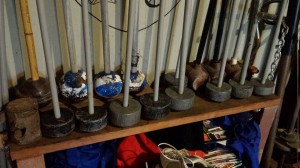OCPD: Weightlifting Sub-type
by Thom Van Vleck

Most, but not all, of my Scottish Hammers....I don't see a problem with having 20 plus hammers....that's normal, right?
Recently the DSM 5 (Diagnostic and Statistical Manual) was released. It has the criteria for diagnosing mental health disorders. I end up referring to it a great deal as part of my job as a Licensed Professional Counselor. The DSM 5 is actually the 7th revision which plays into the fact that there are lots of arguements about what is in it because Mental Health is not as an exact science as we would like. It relies heavily on the observation and self report of a client and not so much on hard science. Someday it will, but not now.
The big argument that comes up every time they revise this thing is what is mentally ill and what is not. Many factors play into this. Some are pretty legit, some are very politically and culturally driven, and some may be related to special interests such as pharmaceutical companies and mental health facilities that stand to make a profit. I’m not cynical, just realistic.
So with that in mind I decided to come up with my own disorder. Obsessive Compulsive: Weightlifting Sub-type. Now right now I need to clarify something. Obsessive-Compulsive Disorder (OCD) is different than Obsessive-Compulsive Personality Disorder (OCPD). Many get these confused. OCD is an anxiety disorder characterized by intrusive thoughts that produce anxiety. The individual then seeks to reduce the anxiety producing thoughts by developing a preoccupation with some obsessive/compulsive behavior. OCPD is a personality disorder and is characterized by a preoccupation with perfectionism and orderliness. This can be with the things around them or the people around them. The funny thing about OCPD is that the person afflicted with it often sees it as a huge plus and a reason for their success….and fail to see how destructive it is to those around them.
So, my OCPD Weightlifting sub-type (and if you haven’t figured out this is mostly tongue in cheek…..and a little not) is geared towards those whose preoccupation with the iron has become a chronic, non-adaptive pattern. Their drive to achieve perfection in training, diet, and all aspects of life that will lead to that holy grail of being the best they can be has led to them becoming asocial, impossible to deal with, and actually leads to the opposite of what they want to achieve. Some of the sub-types include narcissism, passive aggressive, paranoid, antisocial, and histrionic (look that one up…it’s interesting).
Now, I said this was tongue in cheek and it mostly is. There is no way this will ever be a real diagnosis. But I will tell you that I think weightlifters are a “special breed” (that means “crazy” and “nuts” to the average person). We see what we do as good and we often reinforce each other especially when one of those “average” persons points out our insanity. However, we also can box ourselves in with our obsession to the point where we think what we are doing is working and effective when it’s really not. That’s what OCPD: Weightlifting Sub-type really is. I know I’ve had bouts with it. The very nature of the obsessiveness needed to be successful in weightlifting works against you from time to time.
So what do you do? You need to take a step back every once in awhile and take a look at yourself, what you do, have you convinced yourself what you are doing is working or is it REALLY WORKING. Take a look at those around you. Are the blind leading the blind? Sometimes if you are getting angry because someone contradicts your beliefs that may be a good sign you actually are OCPD:WS. A good lifter is always open to new ideas. If you are surrounded by people who agree with you all the time….you better watch out! That means you are all OCPD:WS! Finally, take a hard look at what you do. I was once told by an employer if he asked me why we do something a certain way and my answer was “Because that’s how we’ve always done it” he would fire me on the spot. I made a joke recently that if I ate hot dogs before ever squat workout I could easily surmise hot dogs were the secret if things went well. Never assume, always experiment and you will stay away from the chronic, non-adaptive pattern that characterizes OCPD:WS!
So, do you have OCPD: WS….well….do ya?